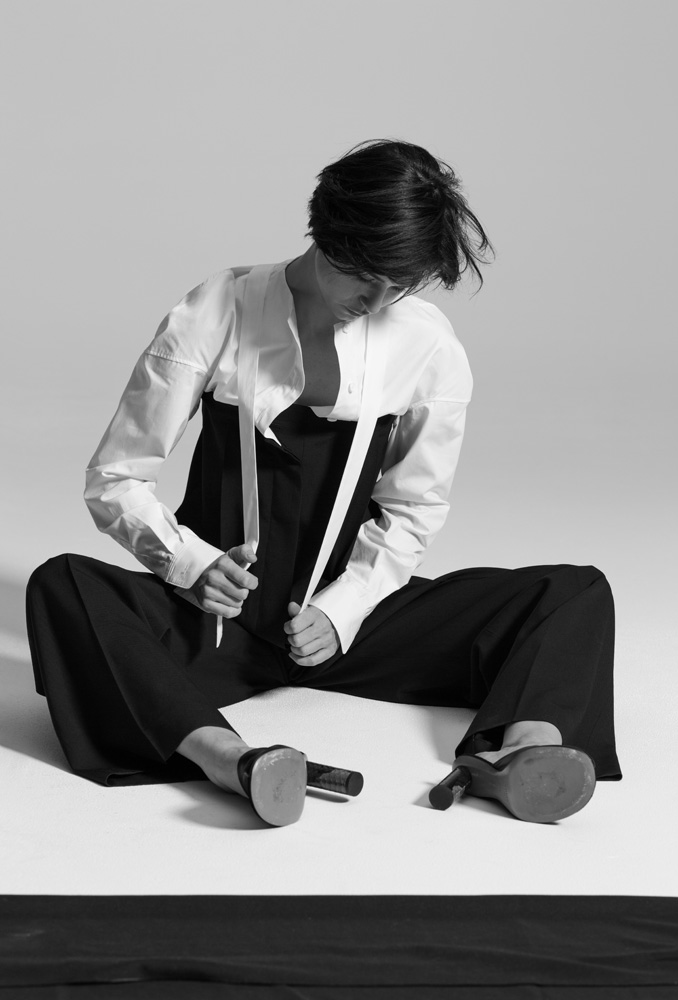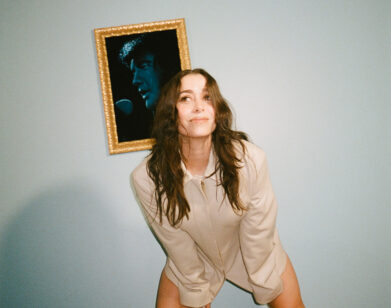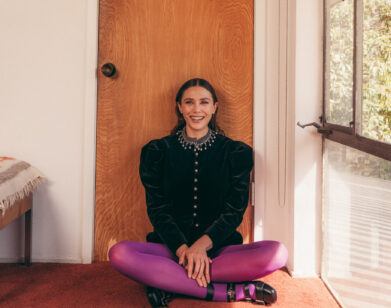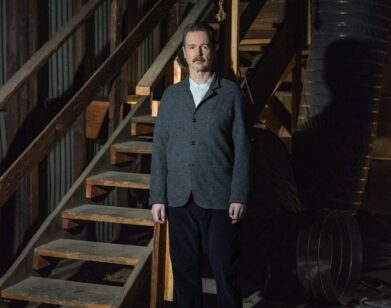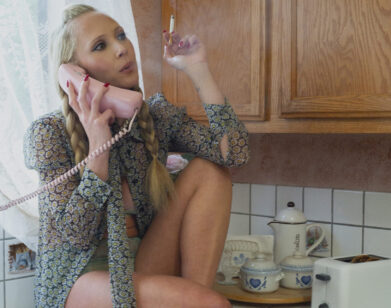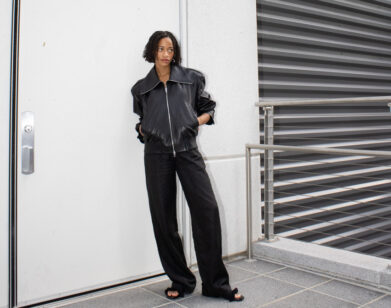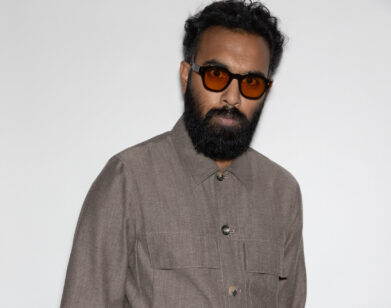Katherine Waterston
Some actresses become stars overnight, over a summer, over the course of several years. For Katherine Waterston, it happened at precisely the moment she emerged from the shadows into the living room of a beach town shack in Paul Thomas Anderson’s Inherent Vice (2014), announcing herself with a whisper: “Psssst!” In addition to setting into motion the story’s Pynchonian mystery, that appearance launched her into her present mainstream breakout, with one expected blockbuster opening this month, three more films on the horizon, and many memorable characters in her wake.
Waterston, the daughter of veteran actor Sam Waterston, spent several years performing Off Broadway, with critically acclaimed turns in The Cherry Orchard and Dreams of Flying Dreams of Falling. Her first feature film role was a small part in Michael Clayton, the 2007 legal thriller starring George Clooney. Eight years, several glancing parts, and Inherent Vice later, the major roles began unfurling: alongside Michael Fassbender in 2015’s Steve Jobs, as the Apple co-founder’s former lover; as a wizardly bureaucrat in last year’s Harry Potter spin-off, Fantastic Beasts and Where to Find Them; and, this month, playing the intergalactic explorer Daniels in Alien: Covenant, the sixth installment in the Alien franchise. And while Covenant is a prequel to the very famous 1979 original, Waterston’s Daniels will surely be linked in the minds of many to her precursor, Sigourney Weaver‘s ass-kicking Ripley. (Big shoes to fill, Waterston is aware.)
As Waterston tells her friend, the actress Natasha Lyonne, it’s tempting to draw a dividing line between her life pre-celebrity and post-celebrity—to see her years of toil followed by years of reward. In this romanticized but facetious vision of her career, Waterston, now 37, emerged from the shadows and into the bright lights of Hollywood, fully formed.
KATHERINE WATERSTON: Hello.
NATASHA LYONNE: Hi, baby.
WATERSTON: Where are you? You sound like you’re walking down the street.
LYONNE: People often think that’s wind, but it’s actually air conditioning in the car.
WATERSTON: Are you driving right now?
LYONNE: I’m pulled over on the side of the road. I’m in the Valley.
WATERSTON: Have I ever told you about the time I was mistaken for a boy at a shirt shop in the Valley?
LYONNE: Which time?
WATERSTON: Actually, you’re right. It’s happened to me multiple times—once in London, once on an airplane. “Gentleman, a couple of things about the emergency exit row …”
LYONNE: Did they think you could handle the responsibilities because you were a man?
WATERSTON: Yes. It’s the upper-body strength you need to swing those levers in a time of crisis. Quick thinking and strong biceps. I have both.
LYONNE: Gender is over anyway. What happened in the Valley when you were mistaken for a man?
WATERSTON: It was actually kind of interesting. I had never been spoken to in that condescending tone older women reserve for stupid young boys. She thought I was messing up the shirts. She said, “Young man! If you’re going to move those shirts around like that, you’ve got to move them back!”
LYONNE: Did that ever happen to you when you had long hair?
WATERSTON: [laughs] It happens more with the short hair. I mean, I’m a big girl, you know?
LYONNE: You’re like a gorgeous woman and a hot teenage boy.
WATERSTON: A eunuch, yeah. Thanks.
LYONNE: When I first saw you in that play Dreams of Flying Dreams of Falling, I remember a candelabrum and a long dining table and you crawling across that and me thinking, “This is maybe the hottest person I’ve ever seen.” I was determined to meet you. So I feel like we have a slightly sexualized relationship as a result.
WATERSTON: Well, it’s definitely mutual. I was so thrilled. I couldn’t believe I was talking with you. I guess we probably did fall in love a little bit that night. It was very difficult for me to get work in those days—even auditions or callbacks or anything—so it meant a lot that you liked those shenanigans on the dining room table. Because I wasn’t exactly getting a lot of encouragement.
LYONNE: I remember us leaving the theater, grabbing a drink …
WATERSTON: It was snowing, and the snow was falling in your hair … And I looked at you and said, “You know, you’re like a snowflake. There’s not another one like you out there.”
LYONNE: And I said, “Young sir, I do believe that you’re the man of my dreams.” [both laugh] I remember, when you were doing Inherent Vice in Los Angeles, you were driving a giant Cadillac that you had somehow gotten a deal on, and your hair was so long. You were like, “Paul Thomas Anderson keeps wanting it blonder.”
WATERSTON: He was worried. There were no blonds in a movie set in Southern California. There were a lot of brunettes in that picture.
LYONNE: What was the experience like on that movie? Were you a big fan of the book before?
WATERSTON: It was such a dream come true. I think I’m still processing just how specifically suited to me that particular experience was. The trifecta of Thomas Pynchon’s words and world and Paul Thomas Anderson’s directing and Joaquin Phoenix, my scene partner, was absurd. It was heartbreaking when it ended, honestly.
LYONNE: It was such a satisfying stroke of genius on Paul’s part to see that in you, because it’s a brilliant meeting of actor and role and world. Do you consider yourself a method actor? Knowing you before and then being with you at the time you were shooting that, I felt like you were in an active state of transformation. I remember when we went to the museum, seeing you pull up in this oversize car. You had morphed from a New Yorker, dressed all hooded and in black, into this denim-wearing, blond-haired Cadillac-driving babe, sitting outside some museum downtown in L.A. Did you feel any of that?
WATERSTON: I sort of feel like I fell into that story and climbed out of it at the end. There’s something particular about the way Los Angeles feels in the summertime. It slows down and is hazy and dreamy, and you can put on certain music and go for a drive and be totally sober but feel stoned.
LYONNE: You don’t have to tell me. Once you’ve been cast, you’re already sort of morphing into that person. Is that true?
WATERSTON: It was a fun character to live with. I think that so much of this stuff has to do with your level of interest in a character—if they’re fascinating to you then it doesn’t feel like a choice to spend your days with them. It happens because it’s fun. I don’t think I necessarily feel like I need to spend every minute of every day listening to music from this period and watching movies from this period. Those things happen because you’re genuinely interested in the story you’re telling.
LYONNE: I remember I was really struck by this feeling of you being immersed in the passion of the work. Most people don’t know that you were a really accomplished but deeply struggling Off Broadway theater actress for so many years. That’s how we all know you in New York-accomplished and brilliant, but definitely struggling. Your dad is a wonderful actor and a great human being, and I’m curious if the environment always skewed toward the work, rather than success. Maybe on some level the idea of self-promotion was never up your alley.
WATERSTON: Self-promotion is not my strong suit, for sure. I don’t look down on it; I just don’t understand how to do it. All those years working and not working in New York—sure, it was painful, but it was also such a personal process for me because no one was paying attention. Obviously, that was difficult financially, but I’m grateful I was left alone with my work for a number of years. It’s more pleasant not to have to defend or explain yourself so much. A lot of what we do is hard to put into words. And I find that I come up short or disappoint myself in trying to even talk about it. There’s an attitude in Hollywood that those are the tough years, and these are the breezy, easy years, but it’s actually a little more complicated than that. The hell of rejection and panicking about whether you’ve really fucked it all up by pursuing a life in the arts, that stuff’s tough, but there’s also a wonderful solace in it. You get to be alone with your work.
LYONNE: Would you say that you’re a solitary person? I always picture you alone reading Zadie Smith or something, but then when we’re together, we’re always laughing so hard.
WATERSTON: I need both. You were the first person I’ve spoken to today.
LYONNE: It’s 6 p.m. in New York!
WATERSTON: It’s probably psychotic, but I live in those two extremes. In the work, it’s all output and expression, obviously, and in a sense, it’s a very social activity. But I find I need to recover a little from that. You’re like that, too. We’ve cancelled plans because both of us have felt like hiding from the world.
LYONNE: I think the cancellation is literally, “I’d prefer to be alone.”
WATERSTON: It’s nice to have friends you can say that to, and it’s okay. [laughs]
LYONNE: I imagine we’re similar in that way—activated by the excitement of interacting with people, and then similarly really wanting to go to that safe, internal place.
WATERSTON: We have to restore. It’s not coal mining and it’s not rocket science, and I don’t want to try to make it out to be something extraordinary, what we do, but it does take a lot out of you.
LYONNE: Remember when we did karaoke that night? I did “Private Dancer” … What did you do?
WATERSTON: I love your version of “Private Dancer,” because you do it like a grandmother from the Upper West Side.
LYONNE: That really is my best Tina Turner impression, a Jewish grandmother from the Upper East Side.
WATERSTON: Did I do “Total Control” by the Motels? Sometimes if I’m feeling tired and I want to go home, just to perk back up again, I’ll do “I Love the Nightlife.” I can’t even remember where we were when we did that.
LYONNE: We were on Avenue A.
WATERSTON: God, I’m a grandmother myself. That was only a few months ago.
LYONNE: Well, it’s a curious thing, acting. Of course, we can see from the outside just how brilliant and transformative a person is. I recently watched Fantastic Beasts, and what really struck me was that your character walks so different than you do. Her gait is like a detective woman’s. She could be a gruff policeman from the ’50s. She could be Dennis Franz in NYPD Blue.
WATERSTON: That’s who I modeled the character after, that’s so weird to hear you say that.
LYONNE: But actually, was this something you were really mindful of? Or did it just happen organically?
WATERSTON: I think everything happens organically. You mine for clues. It’s all immersive and stuff you can use comes out of that immersion. I don’t really like to wear wigs in movies because I like to look like the character all the time. But the big one with that movie was the costumes. When I went for the first fitting, [the costume designer] Colleen Atwood had pulled some skirts and stuff. And as we started working on it, I asked to try on some men’s trousers and then we developed this idea that everything my character wore was stuff that was in her parents’ closet. She had been orphaned as a child, but lived in her parents’ old apartment. So I figured, because she couldn’t really give a damn or be bothered to buy herself anything, she’d be in some modified outfit of her parents. We had some men’s trousers and took them in at the waist and that made them too short. And then with these men’s shoes, which were just a little bit too big for me, it changed the way that I moved. Costumes so often change how you feel. I would normally never be caught dead in a skirt nearly as short as the stuff that I wore in Inherent Vice. But when you find yourself in one, it completely changes you.
LYONNE: You yourself have really striking style. Everything you own is something I immediately covet, even though I’m five feet tall and you’re, like, six feet tall and it would make no sense on me. I’m like, “I need to start wearing oversize slacks immediately, with overcoats.” How incredible was [Beasts co-star] Samantha Morton? She’s one of my all-time heroes.
WATERSTON: The more I admire someone, the more I pretend I don’t know who the fuck they are—that’s the way I deal with it. If I had to admit, to her face, how much I admire her, I never would have been able to shut up, or I would have probably weirded her out. So I basically ignored her. She’s amazing, but we didn’t really get to work together too much in that movie, unfortunately.
LYONNE: Now you’re making me think of when we were both in the U.K. shooting. Do you remember when we went to see Silence and we met at the movie theater and I blamed my behavior on not understanding how things work because of the language barrier that didn’t exist? That was fun.
WATERSTON: We didn’t know how to get into the theater there. We were walking into bathrooms and bars, and everyone was staring at us. It was humiliating. But also you left me in the middle of the show, and I thought you’d walked out. And then I went to look for you and you’d just gone to the back row and you whispered to me, “I didn’t tell you in the beginning, but I hate sitting up close and I need to be on the aisle.” I thought that was so polite of you that you just tolerated this really uncomfortable seating arrangement. I would have been happy to sit in the back with you from the start. I went to see a different movie in London around the same time, and someone walked in during the middle of the show, and suddenly I heard a lighter, and I turned around and there’s this flame—it’s about five inches high—and it’s a lady smoking crack. In the theater.
LYONNE: [laughs] We’re not at the Film Forum anymore! All right, Alien. I saw the trailer and there’s hard evidence to support that indeed Danny McBride did get my part.
WATERSTON: [laughs] That was a tough call. You’re both so talented.
LYONNE: Yes, thank you. Was it a good time making this movie? I imagine that working with Ridley Scott has got to be one of the great joys in life.
WATERSTON: I mean, I don’t want to rub it in your face now, because I know you’re all caught up about Danny stealing your role, but, yeah, it was fun.
LYONNE: Is your character the same one Sigourney Weaver played?
WATERSTON: It’s a new character. It’s many years before the original Alien movie. It’s a sequel to Prometheus [2012] and a prequel to Alien. It’s so weird being an actor because some days you’re just swinging upside-down off the side of a spaceship shooting an alien and you think, “What the hell am I doing here? How did this happen?” But it was fascinating to be a part of something so different from anything I’ve ever done before—to see how it all works. I don’t want to give it away for anyone who hasn’t seen that movie, but we all felt, not just me, that the obvious Sigourney Weaver comparisons I was going to have to deal with … I think we all felt that those were big shoes to fill. But then when we got on set, Ridley wasn’t worried about that at all. We never really talked about it, and I think it put us all at ease. We had a different story to tell, and we set about telling it. There’s something scrappy about Ridley’s attitude. I think sometimes when people have as much success as he’s had, they don’t mind being put on a pedestal, and they allow everyone to feel like it’s a special experience that we’re getting to work with them. But Ridley’s just a scrappy kid. He has the gift of eternal youth, he has so much energy on set, and he doesn’t take it all so seriously. At one point, my space helmet wasn’t fitting right, and he just got some duct tape and stuck it in place. It wasn’t half an hour where the props department got together with the special effects department and everybody scratched their heads and did some kind of advanced tech repairs or anything. He just got in there and got it done so we could get on with it. We’re just kids playing in the sandbox.
LYONNE: It’s no accident that all of these giants are trying to work with you.
WATERSTON: I love you.
LYONNE: You’re brilliant and I’m so excited to see all your work. And really, I just want you back here in the car. Where you belong. What book are you reading? Right now.
WATERSTON: Right now in front of me, I’ve got the Robert Lowell biography. And Swing Time by Zadie Smith.
LYONNE: See, classic Waterston.
NATASHA LYONNE IS A NEW YORK–BASED ACTRESS WHOSE CREDITS INCLUDE THE SERIES ORANGE IS THE NEW BLACK AND THIS MONTH’S HANDSOME: A NETFLIX MYSTERY MOVIE. HER UPCOMING FILMS INCLUDE SHOW DOGS AND A FUTILE & STUPID GESTURE.

